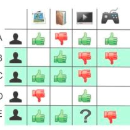Collaborative filtering is a critical technique in recommender systems. It has been increasingly viewed as a conditional generative task for user feedback data, where newly developed diffusion model shows great potential. However, existing studies on diffusion model lack effective solutions for modeling implicit feedback. Particularly, the standard isotropic diffusion process overlooks correlation between items, misaligned with the graphical structure of the interaction space. Meanwhile, Gaussian noise destroys personalized information in a user's interaction vector, causing difficulty in its reconstruction. In this paper, we adapt standard diffusion model and propose a novel Graph Signal Diffusion Model for Collaborative Filtering (named GiffCF). To better represent the correlated distribution of user-item interactions, we define a generalized diffusion process using heat equation on the item-item similarity graph. Our forward process smooths interaction signals with an advanced family of graph filters, introducing the graph adjacency as beneficial prior knowledge for recommendation. Our reverse process iteratively refines and sharpens latent signals in a noise-free manner, where the updates are conditioned on the user's history and computed from a carefully designed two-stage denoiser, leading to high-quality reconstruction. Finally, through extensive experiments, we show that GiffCF effectively leverages the advantages of both diffusion model and graph signal processing, and achieves state-of-the-art performance on three benchmark datasets.
翻译:暂无翻译





